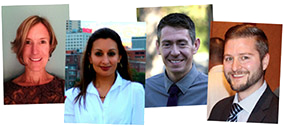
Recent graduates and new faces in the DFMCH’s addiction medicine fellowship program.
The UW Department of Family Medicine and Community Health (DFMCH) congratulates the first two graduates of its addiction medicine fellowship, and welcomes two new fellows to the program.
The fellowship, offered in collaboration with the William S. Middleton Memorial Veterans Hospital, was one of the first in the country to train family physicians to become board certified in addiction medicine.
Learn more about each fellow below:
Graduate Molly Rossignol, DO: State-Level Leadership
Molly Rossignol, DO, the DFMCH’s first addiction medicine fellow, moved to Hopkinton, New Hampshire after graduating in July 2015. She works as an addiction specialist in a community hospital and an outpatient federally-qualified health center, and teaches family medicine residents and colleagues about addictive disorders.
“My motive is to provide evidence-based, patient-centered care to people with substance use disorders…and quell the stigma that accompanies these illnesses.”
—Molly Rossignol, DO
Dr. Rossignol also sits on three New Hampshire “subtask” forces, which are:
- Creating a naloxone rollout to physicians and patients;
- Evaluating the state of medication-assisted treatment and how to increase access for patients in need; and
- Addressing overall opioid use disorders and prescribing practices statewide.
In addition, she is president-elect of the New Hampshire Academy of Family Physicians, and on the board of the New Hampshire Lawyers Assistance Program.
“My motive is to provide evidence-based, patient-centered care to people with substance use disorders,” she explained. “I also hope to quell the stigma that accompanies these illnesses by collaborating with colleagues and agencies around the state that are doing similar work already.”
Graduate Shalu Gugnani, MD: Comprehensive Practice
Shalu Gugnani, MD, who graduates in October 2015, worked at William S. Middleton Memorial Veterans Hospital and VA Primary Care, Access Community Health Centers, and UW Hospital and Clinics throughout her fellowship. She and her colleagues treated patients struggling with substance use disorders, especially opioid and alcohol misuse, many of whom also had mental health issues or pain diagnoses.
She also participated in a research project in which patients used a mobile app to engage with fellow patients, track their own recovery, and document potential crisis-intervention needs.
“Being part of two strong, supportive teams has been an invaluable experience…and I hope to experience this type of collegiality throughout my career.”
—Shalu Gugnani, MD
After graduation, Dr. Gugnani will join NCH Medical Group in Arlington Heights, Illinois, where she will provide residential, outpatient and intensive outpatient/partial hospital services, as well as collaborate with medical teams to treat patients hospitalized for complicated overdose or withdrawal.
“Being part of two strong, supportive teams has been an invaluable experience,” she reflected. “It is the discussions we have surrounding challenging cases that are thought-provoking and can give me a different perspective. Working with these teams has really been the best experience, and I hope to experience this type of collegiality throughout my career.”
New Fellow Jordan Mills, DO, PhD: Nutrition Expertise Informs Addiction

During his medical training, he cared for many patients with substance use disorders and developed an interest in addiction medicine.
As a fellow, Dr. Mills is teaching students in the UW School of Medicine and Public Health’s Substance Abuse and Addiction Interest Groupabout the importance of addressing addiction in general medical settings.He also has research interests in the similarities between substance use and eating disorders.
Most recently, he teamed up with fellowship director Randall Brown, MD, PhD, FASAM, to present an educational session on substance misuse during UW-Madison’s biannual “Greek Life” orientations.
New Fellow Matthew Thomas, MD: Long-Standing Interest in Addiction Medicine
Matthew Thomas, MD, began his fellowship in October 2015. He earned a bachelor’s degree in biology from Loyola University Chicago, and completed his medical degree and family medicine residency at the University of Illinois College of Medicine at Rockford.
Having seen the effects of the opiate epidemic and the poor access to treatment many addicts face, Dr. Thomas’s interest in addiction medicine began early in his education. During medical school, he worked with underserved populations as part of the Underserved Pathway Program.
“I would like to continue bringing awareness to the medical community, as well as the general population, to promote education and knowledge about the detrimental effects of addiction.”
—Matthew Thomas, MD
He looks forward to completing the addiction medicine fellowship and becoming board certified so that he can help improve access to treatment for suffering addicts and their families.
“During the course of training in the addiction medicine fellowship, I intend to achieve expertise in helping individuals and their families who are affected by the disease of addiction,” Dr. Thomas said. “I would like to continue bringing awareness to the medical community, as well as the general population, to promote education and knowledge about the detrimental effects of addiction.”
Published: October 2015

 “My motive is to provide evidence-based, patient-centered care to people with substance use disorders…and quell the stigma that accompanies these illnesses.”
“My motive is to provide evidence-based, patient-centered care to people with substance use disorders…and quell the stigma that accompanies these illnesses.” “Being part of two strong, supportive teams has been an invaluable experience…and I hope to experience this type of collegiality throughout my career.”
“Being part of two strong, supportive teams has been an invaluable experience…and I hope to experience this type of collegiality throughout my career.” “I would like to continue bringing awareness to the medical community, as well as the general population, to promote education and knowledge about the detrimental effects of addiction.”
“I would like to continue bringing awareness to the medical community, as well as the general population, to promote education and knowledge about the detrimental effects of addiction.”